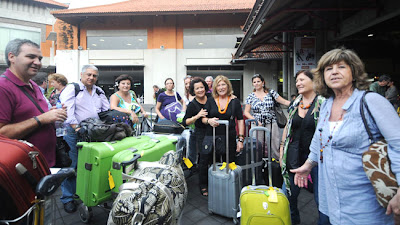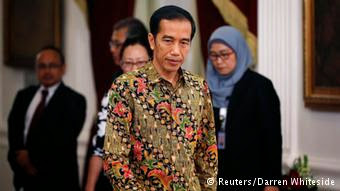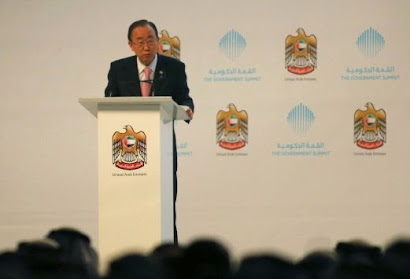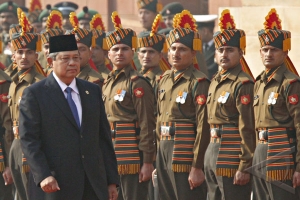 |
Darma Jaya Toasebio Vihara in Glodok, Central Jaya. (Photo: PIRHOT NABABAN) |
News and information about Culture and Tourism in Indonesia (Asean & Asia)
"The State of the Earth" - The Predicted Weather Shift (Mini Ice Age - 2032 !!)
Indonesia executes six drug convicts, five of them foreigners
- Related Articles ...
- Australian gran escapes death in Malaysia drugs case
- Indonesia Rejects UN Recommendation to Abolish Death Penalty
- Iran parliament softens drug death penalty laws
- Philippine Church in 'show of force' against drug killings
- Duterte executions plan is barbaric: Philippine critics
- Philippines' Duterte calls Obama 'son of a whore'
- Minister: Indonesia Putting Executions on Hold to Focus on Economy
- Indonesia, Netherlands Organize Harm Reduction Talks at UNODC
- Narcotics Agency: Drugs Kill 33 Indonesians Daily, Not 40-50
- Curb Your Enthusiasm for Firing Squads: Indonesian Ex-Foreign Minister
- Widodo Promises to Act on Police Chief Spat as Popularity Hit
- 100 days in power - Has Indonesia's Jokowi shaken things up?
Ban appeals to Indonesia to stop death row executions
Pope: 'Death penalty represents failure' – no 'humane' way to kill a person
- More Articles ...
- Brunei says death penalty moratorium to cover sharia laws
- Death penalty 'inadmissible' in Catholic teaching update
- Philippine Church in 'show of force' against drug killings
- Vatican to open its doors to 1,000 prisoners
- Pope Francis Says He'd Love to Visit Indonesia
- Pope Francis visits correctional facility
- Pope calls for global abolition of death penalty
- Pope meets relatives of Pakistani Christian on death row
- Pope hails Iran accord, urges end to 'absurd violence' in Easter message
- Pope: 'Death penalty represents failure' – no 'humane' way to kill a person
- More Articles (Death Penalty - Indonesia} ....
- Indonesian court sentences French drug smuggler to death
- Rights Group Urges Govt to Include Death Penalty Moratorium in Law Reform Package
- Indonesia executes foreign convicts despite protests
- Minister: Indonesia Putting Executions on Hold to Focus on Economy
- Eight Convicts Executed Despite World Leaders’ Appeal
- Indonesia Regrets Beheading of Another Domestic Worker in Saudi Arabia
- Minister to Investigate Age of Death Row Convict Whom Activists Say Is Juvenile
- Ban appeals to Indonesia to stop death row executions
- Garuda Says Its Planes Will Not Transfer Bali Nine Duo to Place of Execution
- Statement by the Chan and Sukumaran Families
- Dutch Ambassador Back in Indonesia After Recall Over Death Penalty
- Why didn't Indonesia's Jokowi stop the execution of drug traffickers?
- Foreign Ministry: Netherlands, Brazil Ties Not Harmed, Oz Efforts ‘Respected’
- Nigeria Summons Indonesian Ambassador Over Executions
- Australia Pursues Plea to Spare Drug Smugglers on Indonesia’s Death Row
- Amid Execution Outcry, AG Says Respect Indonesia’s Laws
- Brazil and Netherlands recall Indonesia ambassadors over drug executions
- Indonesia executes six drug convicts, five of them foreigners
- Last ditch efforts to stop Indonesia executing Utrecht man
- More Articles (Death Penalty - Asia/Middle East) ....
- Brunei says death penalty moratorium to cover sharia laws
- Errors found in Hebei murder case 20 years after execution
- Vietnamese Drug Convict Awaiting Execution Expresses One Final Wish
- China plans to scrap death penalty for 9 crimes: Xinhua
- Blood Money Finalized for Indonesian Migrant Worker Facing Death in Saudi Arabia
- SBY Meets With Families of Migrant Workers Facing Death Sentences Overseas
- Saudi Arabia Beheads Indonesian Woman Convicted of Murder
- Govt intensifying efforts to protect migrant workers
Obama becomes first president to visit US prison (US Justice Systems / Human Rights)
US Death Penalty (Justice Systems / Human Rights)
- Innocent New Yorker gets $6.25 mn for 25 years in jail
- After 43 years in isolation, US man Albert Woodfox to be freed
- Former death row inmate and brother pardoned in 1983 rape-murder of girl
- Flawed FBI forensic testimony comes back to haunt US criminal justice system
- US man exonerated after 30 years on death row
- Woman who spent 23 years on US death row cleared
- Man freed 39 years after death sentence is awarded $1m in compensation
- More Articles (Death Penalty - US) ....
- Connecticut's top court rules death penalty unconstitutional
- US cinema shooter escapes death penalty
- US Stays Out of Row on Indonesian Executions
- Obama Commutes Sentences of 22 Drug Offenders
- Family of Ohio man who snorted and gasped during execution drops lawsuit
- Ohio death penalty anonymity law is unconstitutional, inmates say
- US executes man despite disability claim
- Botched Arizona execution takes almost two hours
- US federal judge rules California death penalty unconstitutional
- Botched execution 'deeply troubling', says Barack Obama
"#Happiness is our people's right. We shouldn't be too hard on behaviors caused by joy." 29/6/2013
— Hassan Rouhani (@HassanRouhani) May 21, 2014Thousands of people are already dancing for a #HappyPlanet! Join in at http://t.co/OfXTxf1A8q #happyday pic.twitter.com/XF02VkW2B7
— Google (@google) 19 maart 2015New (Energy) Pope
- More Articles .....
- Bishops urge Pope to open priesthood to married men in Amazon
- Pope blames Amazon fires on destructive 'interests'
- Pope signs Jerusalem declaration on Morocco trip
- With too few priests, Portuguese women step up
- Pope makes historic visit to Rome Anglican church
- Catholics and Lutherans sign joint declaration 'accepting common path'
- Pope Francis Says He'd Love to Visit Indonesia
- Pope, patriarch urge Christian unity at historic talks
- Pope and Russian patriarch to meet for the first time
- Obama decries anti-Muslim rhetoric on first mosque visit
- Pope hails ties with Jews on landmark synagogue visit
- Pope Francis seeks Bolivians' forgiveness for colonial-era crimes
- Pope Francis calls for peace, end to slavery in 2015
- Syncretist Celebrations of Imlek, Lent and Tolerance
- Jokowi Condemns Paris Attacks, Calls for Respectful Creative Expression
.
“… The Shift in Human Nature
You're starting to see integrity change. Awareness recalibrates integrity, and the Human Being who would sit there and take advantage of another Human Being in an old energy would never do it in a new energy. The reason? It will become intuitive, so this is a shift in Human Nature as well, for in the past you have assumed that people take advantage of people first and integrity comes later. That's just ordinary Human nature.
In the past, Human nature expressed within governments worked like this: If you were stronger than the other one, you simply conquered them. If you were strong, it was an invitation to conquer. If you were weak, it was an invitation to be conquered. No one even thought about it. It was the way of things. The bigger you could have your armies, the better they would do when you sent them out to conquer. That's not how you think today. Did you notice?
Any country that thinks this way today will not survive, for humanity has discovered that the world goes far better by putting things together instead of tearing them apart. The new energy puts the weak and strong together in ways that make sense and that have integrity. Take a look at what happened to some of the businesses in this great land (USA). Up to 30 years ago, when you started realizing some of them didn't have integrity, you eliminated them. What happened to the tobacco companies when you realized they were knowingly addicting your children? Today, they still sell their products to less-aware countries, but that will also change.
What did you do a few years ago when you realized that your bankers were actually selling you homes that they knew you couldn't pay for later? They were walking away, smiling greedily, not thinking about the heartbreak that was to follow when a life's dream would be lost. Dear American, you are in a recession. However, this is like when you prune a tree and cut back the branches. When the tree grows back, you've got control and the branches will grow bigger and stronger than they were before, without the greed factor. Then, if you don't like the way it grows back, you'll prune it again! I tell you this because awareness is now in control of big money. It's right before your eyes, what you're doing. But fear often rules. …”
- More Article ...
- Basuki to Fire Officials Who Fail to Submit Wealth Reports
- Govt to Enact Regulation Requiring All Public Officials to Disclose Wealth
- Critics Lash Out at Call for Immunity for KPK Leaders
- KPK Seizes Homes, Cars and Cash From E. Java Politician
- KPK to Give New Ministers Transparency Training
- KPK Said to Vet Jokowi’s Ministers
Sunday, January 30, 2011
Hundreds flock to Jakarta’s oldest Chinese temple
Friday, January 28, 2011
Australian travellers stranded due to volcanic ash
 |
| Stranded passengers wait at Ngurah Rai airport in Bali's city of Denpasar after their plane to Singapore was cancelled / AFP |
- Volcanic ash floating over Indonesia
- Forces flights to be grounded, cancelled
- Hundreds of Aussies face holiday disruption
A FIERY volcano is causing holiday misery for hundreds of Australians with airlines cancelling flights as a large ash cloud floats in the skies above Indonesia.
Related Articles:
Thursday, January 27, 2011
News Focus: President`s Visit To India Demonstrates Higher Level Bilateral Ties
Tuesday, January 25, 2011
Little Green Men Means a Little Green Dough for Enterprising Indonesians
Sunday, January 23, 2011
University seeks to develop agrotourism in Bali
Komodo National Park drops to 26th place in global poll
Seren Taun
Friday, January 21, 2011
Australia to build "peace museum" in Indonesia's Bali
Wednesday, January 19, 2011
Unesco recognizes ‘angklung’ as intangible cultural heritage
Jakarta US embassy asks for $100,000 for its Facebook page: Wikileaks
A cable sent in February by US diplomats in the Indonesian capital described itself as "already the leading US Mission in the World on Facebook with nearly 50,000 'fans', and one of the leading missions using Twitter, YouTube and engaging local bloggers to promote USG [US government] messages and information."
"If the White House approves, we could invite fans to post why they should meet President Obama, and in doing so, use our social media platform to connect fans to the visit, as well as build excitement beforehand and follow-up coverage afterwards"
Tuesday, January 18, 2011
President meets with interfaith leaders
Monday, January 17, 2011
RI generates Rp 117 billion from Dutch travel expo
Friday, January 14, 2011
United States Welcome to Monitor Torture Trial: Indonesia Military
President to dedicate Batak museum

From the past: Visitors view artifacts from the Batak tribe group in the TB Silalahi Batak Museum in Tobasa, North Sumatra, Tuesday. The museum was recently officially opened by president Susilo Bambang Yudhoyono (Antara/Septianda Perdana)

King Marnangkok Naipospos, give grains of rice to the head a number of people at a ceremony in the hall Pasogit Parmalim Hutatinggi Village, Town Laguboti, District Sanosir Toba, North Sumatra, Monday, July 26, 2010. (Demotix)
Related Articles:












